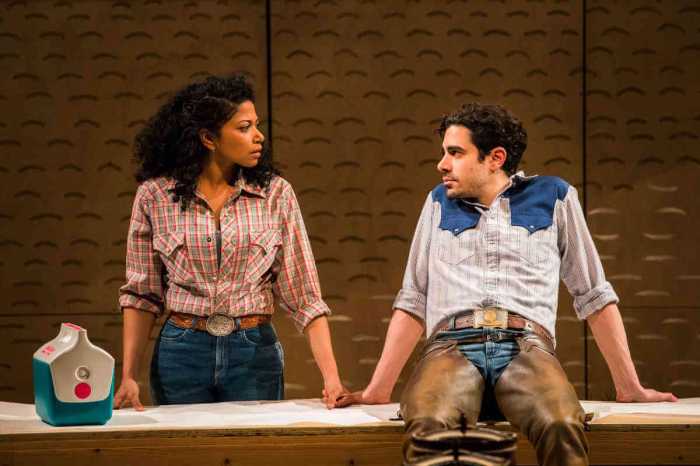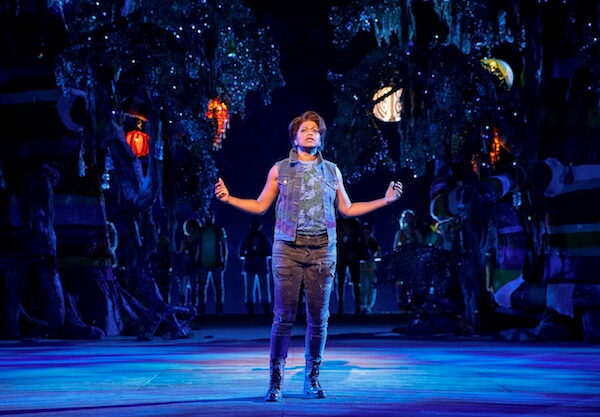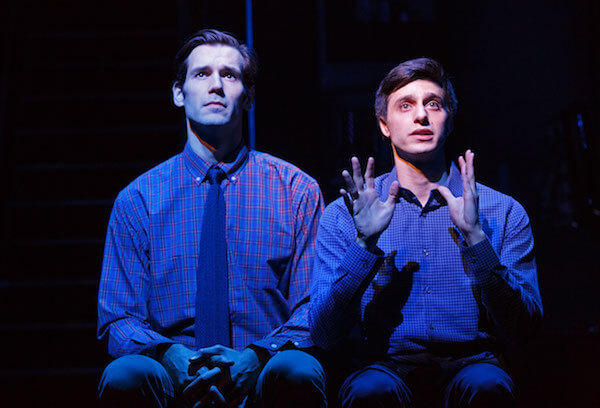Roberta Maxwell and Amy Warren in Richard Nelson’s “What Did You Expect?” | JOAN MARCUS
“What Did You Expect?,” the second in a three-play cycle, “Election Year in the Life of One Family,” is profoundly moving. The continuing story of the Gabriel family in Rhinebeck, New York, is set against real events unfolding in real time. Things as topical as Donald Trump’s recent appearances on late night television are filtered through the conversation among family members. (The play continued to be updated through the official opening night.)
Playwright Richard Nelson, who also directed, has achieved something nearly impossible — certainly not seen in the work of his contemporaries — creating a completely believable family. No willing suspension of disbelief is required. There are no abstractions or metaphors. This is real life unfolding in real time for characters we come to care for intimately through small, hardly dramatic but achingly real events that make up life in 2016.
The Gabriels are still mourning the loss of a brother, son, and husband, Thomas Gabriel, a noted playwright whose recent death was central to the first play in the series, “Hungry.” “What Did You Expect?” takes place six months later. The Gabriels are on shaky financial ground, trying to figure out how to get from day to day — paying healthcare bills for an aging parent, selling a treasured Bechstein piano probably for less than it’s worth, and digging through Thomas’ papers for treasures that might also be sold.
Two new shows stir the soul with honesty and humanity
Their situation is rendered ironic because Rhinebeck has become a playground for the rich and careless, the sort of people who are targets of Nelson’s most trenchant and deftly handled social criticism. As the play opens, the family is preparing to go on a literary picnic with a group of these young wealthy people who may have carpentry work for George that will tide them over. If not, who knows? These are smart, educated, and loving people for whom life hasn’t quite worked out. The searing authenticity with which Nelson portrays their lives slowly accumulates over the evening so that the simple act of getting dinner on the table becomes a kind of heroic act.
The cast from the first play has returned. Led by the sublime Maryann Plunkett as Mary, Thomas’ third wife, she is an anchor of sorts for the family, though the ground is clearly shifting beneath her. Jay O. Sanders is marvelous as her brother-in-law George who is eager for work, an enthusiastic fan of Melville and Hawthorne, and far too kind to his non-paying piano students. Lynn Hawley is excellent as Hannah, George’s wife, and Amy Warren gives a finely detailed performance as George’s younger sister, Joyce, who lives in New York and ekes out her modest success in costume design as a cater waiter. Roberta Maxwell is the matriarch, still trying to hold on, who has been guided to terrible financial decisions but still understands her children very well. As in the first play, Meg Gibson plays Karen, Thomas’ first wife who is renting a room in the house. The delicacy with which she is both part of and removed from the core family makes her one of the most intriguing characters in the piece.
It is Karen who at the beginning of the play, reading from one of Thomas’ unproduced plays, sets the tone for what follows. It is a scene from a French play Thomas has translated about two men looking through the window of a home where the happy life they see is about to be shattered by news the men know but the family does not. It is a brilliant device and Nelson’s most artistic, acknowledging theater’s inherent artifice in language that is poetic when the Gabriels’ language is not. It juxtaposes a play, where a creator can guide everything that happens, against the sloppy, uncontrollable realities that make up real life. Breathtaking art and visceral truth become one and the same. It’s rare and beautiful, but, then, that’s exactly what we’ve come to expect from Nelson and his company.
Rebecca Naomi Jones and Kecia Lewis in George Brant and directed by Neil Pepe’s “Marie and Rosetta.” | AHRON R. FOSTER
When Kecia Lewis sings, pretty much all is right with the world. And sing she does in the new bio-musical “Marie and Rosetta” now at the Atlantic. Whether in a full-throated belt or a subtler ballad, Lewis’ sublime voice is rich in nuance and flawless technique as she portrays Sister Rosetta Tharpe, a 1940s gospel singer whose unique style was considered a precursor of rock-and-roll.
The piece, for the most part, is set in 1946 as Tharpe teams up with a younger, more traditional gospel singer, Marie Knight. Tharpe, having sung in New York clubs, finds herself less welcome on the gospel circuit, as her hip-
swinging interpretations challenge the conventional and, to Rosetta’s mind, overly strait-laced concept of gospel music. The idea is that the two of them will revitalize Tharpe’s career while establishing Knight as a star. It’s not giving anything away to reveal that this is exactly what happened in real life.
The story focuses on how on the night before their first performance together, the two women meld their styles and create a bond that will last for years — singing all of Tharpe’s hits and a few gospel classics, as well. Rebecca Naomi Jones as Knight is every bit as much a vocal powerhouse as Lewis, and the two voices complement each other very well. The spirit is truly moved by the joyful noise that sweeps you away when these two women let out the stops.
As often happens in a biography-heavy show like this, the book scenes are a little clunky. The desire to tell history creates exposition where it doesn’t feel like real people are talking, but Lewis and Jones are so delightful as performers that this doesn’t matter so much. The show written by George Brant and directed by Neil Pepe might function better as a revue than in attempting to be a book musical; one eye-rolling reveal at the end plays more as a gimmick to cram in a whole lot more information than as character-driven theater. Still, “Marie and Rosetta” is all about the music, and regardless of your religious sentiments you can’t help but be uplifted by the spirit and charisma of these performances.
WHAT DID YOU EXPECT? | Public Theater, 475 Lafayette St., btwn. E. Fourth St. & Astor Pl. | Through Oct. 9: Tue.-Sat. at 7:30 p.m.; Sat.-Sun. at 2 p.m. | $65 at publictheater.org or 212-967-7555 | One hr., 40 mins., no intermission
MARIE AND ROSETTA | Atlantic Theater Company, 336 W. 20th St. | Through Oct. 16: Tue. at 7 p.m.; Wed.-Sat. at 8 p.m.: Wed., Sat.-Sun. at 2 p.m. | $49.50-$95 at atlantictheater.org or 866-811-4111 | Ninety mins., no intermission




































